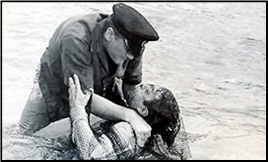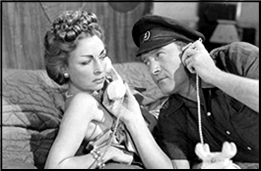Mon 16 Aug 2021
A Movie Review by Dan Stumpf: CAPTAIN BLACKJACK (1950).
Posted by Steve under Action Adventure movies , Reviews[5] Comments

CAPTAIN BLACKJACK. Alsa Films, UK. 1950, as Black Jack; Classic Pictures, US, 1952. George Sanders, Herbert Marshall, Patricia Roc, Agnes Moorehead and Marcel Dalio. Written by Julien Duvivier, Robert Gaillard, Michael & Rolland Pertwee, and Charles Spaak. Directed by Julien Duvivier.
A mess. It sparkles at times, with a great cast, fine locations, and haunting visuals, but it’s still a mess.
George Sanders made one other film in 1950, All About Eve, and he complained that the producers of Captain Blackjack didn’t know how to make a movie. Certainly, they should have sprung for better film stock and decent sound recording, but their biggest mistake was hiring George Sanders.

For purposes of the story here, Sanders is a successful smuggler operating out of Mallorca and Tangiers, on the verge of that pre-doomed enterprise, The One Big Score that will enable him to quit the business. When Captain Marcel Dalio seeks his help with the Chalcis, a slowly sinking ship full of refugees, George sails to the rescue, offers a free ride to the beautiful Patricia Roc — who refuses — then takes the six wealthiest passengers and advises Dalio to ground the ship on a nearby island before it sinks with the rest.
Back in Mallorca, Sanders meets up with an old Doctor-buddy (Herbert Marshall) finds Dalio in town, unencumbered by the Chalcis, and spots Roc working for wealthy and eccentric dowager Agnes Moorehead. And then….

And then everybody just kind of goofs off for an hour or so of running time. It eventually transpires that Dalio, horny and murderous, conked Roc on the cupola, tossed her in a lifeboat, then locked the other passengers below decks and sank the Chalcis before shooting his first mate and making off for Tangier with Roc.
It also develops that the Authorities have been tipped off about an anticipated cargo of drugs, and lie in wait for whoever picks it up. Other smugglers have also tumbled to it, and are plotting to take it for themselves. Sanders, however, has been redeemed by his love for Roc, and determines to destroy the filthy stuff before it can bring more misery into the world — or get him locked up in a Spanish hoosegow.

There are more twists yet to come, Moorhead and Marshall are in fine form, and Marcel Dalio’s greedy killer role will surprise those who remember him as the croupier in Casablanca or the hotelier of Hawks’ To Have and Have Not.
Director Duvivier evokes some fine, even memorable visuals here: the opening shot of the dying refugee ship limping to shore, Patricia Roc silhouetted against a jagged coast, and our hero stalking a dying man through an eerie cave filled with baroque stalactites and stalagmites. But it’s all for naught, because the leading man seems indifferent to it all.
At one point Sanders walked off the set, claiming his pay was in arrears, and this may have contributed to the general sense of malaise he projects throughout the film. He never was the most electrifying of thespians, but here he seems near comatose. Even when strangling Agnes Moorehead or drowning poor Dalio, he barely registers a heartbeat.
And it’s George Sanders after all who’s at the heart of this thing. If we’re to get involved at all, we must believe he’s really anxious about his scheme, really falls in love with Roc, really reforms, and all the rest of it. But he never seems to care.
So why should we?

August 16th, 2021 at 6:26 pm
In the right role his indifference was ideal, but not here, you just don’t cast Sanders in the Errol Flynn role successfully.
Great cast though, pretty good director, too many cooks in the screenplay, too many cliches, leading man who seems to wish he was anywhere else doing anything else.
August 16th, 2021 at 6:37 pm
Captain Blackjack was one of several films Louis Hayward had been announced for, but he walked away from this one and did Pirates of Capri instead, another film with financing problems, but the money did come in. The other films, Black Magic for Eddie Small, the same year as this thing, which ended up being made with Orson Welles, and a few years later, a re-teaming with Dennis O’Keefe for The Diamond Wizard, done with EADY plan money and Phillip Friend.
August 17th, 2021 at 3:43 pm
Further on Captain Blackjack. Apparently released at ninety minutes worldwide with the exception of France, goosed up to 105 minutes. Does the added length matter? My guess, it does.
August 17th, 2021 at 7:19 pm
Barry,
I had wondered if they wrote the Friend part in WIZARD with Hayward in mind, reversing WALK by moving the action to England. The byplay and style of the film, despite veering into Bondish SF, is very much in the style of WALK. Despite the relatively low budget it would have been great to see them teamed again.
August 17th, 2021 at 7:32 pm
Exactly what they thought, Hayward and O’Keefe, but it was Dennis’ deal and Hayward qualified as an Ameican. Too bad.